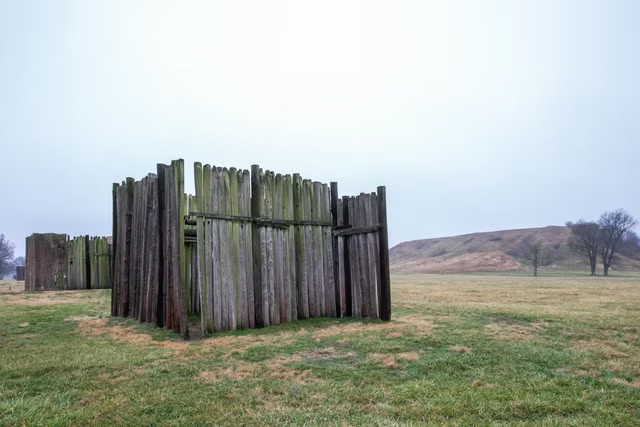Archaeologists have uncovered an Iron Age cemetery around an earlier prehistoric burial mound in Germany.
The remains were discovered close to the River Weser in the Minden-Lübbecke district of North Rhine-Westphalia, a state located in the west of the country, the Westphalia-Lippe Regional Association (LWL) announced in a statement.
Experts from LWL-Archaeology for Westphalia had requested an investigation of the area because they suspected that a burial site was hidden in the ground close to the mound, which was already known about.
LWL archaeologists think the burial mound dates to the Bronze Age (roughly 2000-800 B.C. in this region) and was likely constructed at some point in the 2nd millennium B.C. The mound is no longer present because of the plowing that has occurred over the past centuries, but a circular enclosing ditch remains, marking its location, Sebastian Düvel, scientific advisor with LWL-Archaeology for Westphalia, told Newsweek.
The burial site around it, by contrast, is later, dating to the Iron Age (roughly 800 B.C. to 1 B.C.). According to the archaeologists, the placement of the burials here appears to have been a deliberate decision rather than a coincidence given that similar sites have been discovered in the local area during the past few years.
"In this region, especially near the River Weser, the people of the Iron Age used older mound graves to bury their own relatives. These mounds to them were already age-old landmarks alongside the river and probably formed a kind of sacred landscape," Düvel said.
The Iron Age cemetery was dedicated to people who had been cremated, the available evidence suggests. Excavations uncovered four graves containing urns from the early- to mid-Iron Age and around 20 late Iron Age burials featuring the remains of funeral pyres, as well as cremated bones and artifacts.
A funeral pyre is a structure, usually made of wood, used to burn bodies as part of funerary ritual, or sometimes, an execution.
Among the artifacts uncovered in the later graves of the Iron Age cemetery were belt hooks and a piece of spiral-shaped jewelry. Most of the artifacts were burnt, having been placed on the pyres during the process of cremation.
The early Iron Age people in this region belonged to the so-called "Nienburger Gruppe"—named after a discovery made at a location along the Weser. This group is part of the pre-Jastorf and Jastorf Culture of northern Germany.
In late Iron Age Westphalia there were several local groups whose material culture shows influences of and contacts with the La Tène culture, which is associated with Celtic peoples, according to Düvel.
No burials have been found in the Bronze Age mound. This is probably because any remains were placed on the ground in very shallow graves before the mound was built.
"Due to farming, the mound and the graves were very likely destroyed," Düvel said.
Do you have a tip on a science story that Newsweek should be covering? Do you have a question about archaeology? Let us know via science@newsweek.com.
Disclaimer: The copyright of this article belongs to the original author. Reposting this article is solely for the purpose of information dissemination and does not constitute any investment advice. If there is any infringement, please contact us immediately. We will make corrections or deletions as necessary. Thank you.



